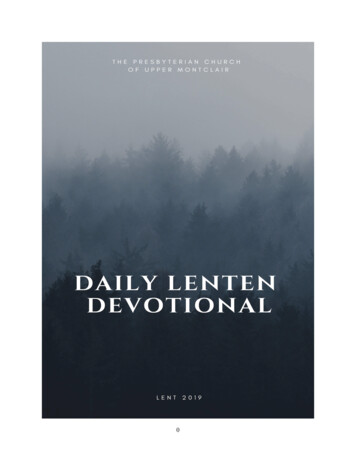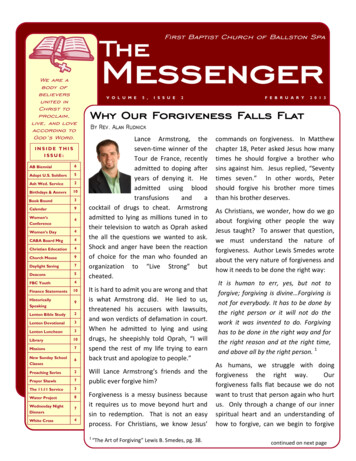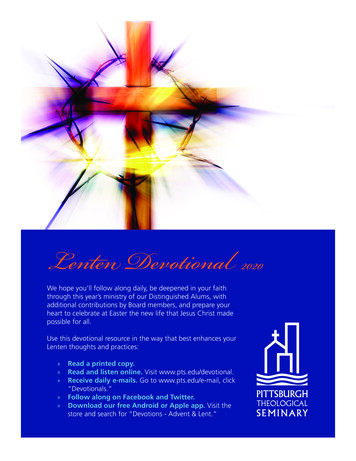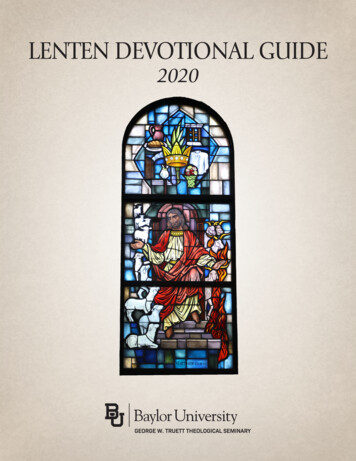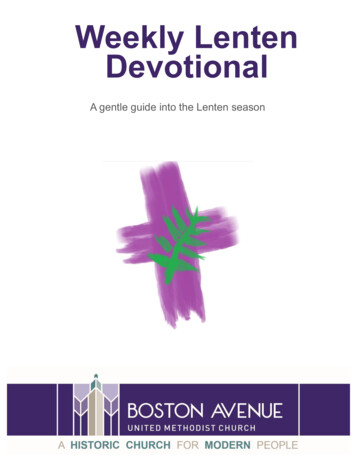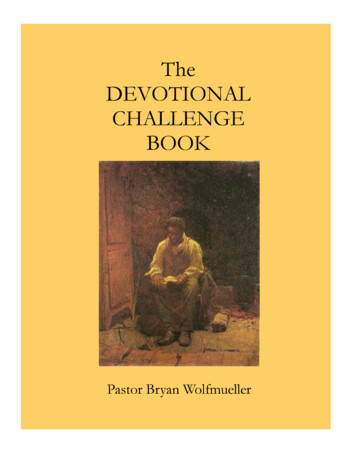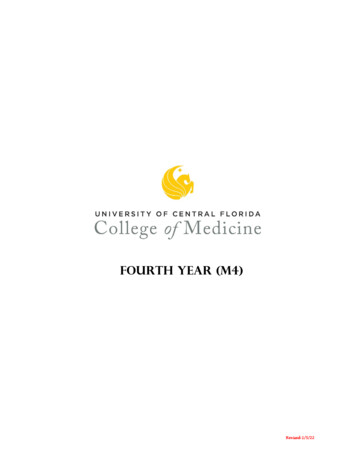
Transcription
Lenten Devotional 2022We hope you’ll follow along daily, be deepened in your faiththrough this year’s ministry of our community, and prepare yourheart to celebrate at Easter the new life that Jesus Christ madepossible for all.Use this devotional resource in the way that best enhances yourLenten thoughts and practices:»»»»»Read a printed copy.Read and listen online. Visit www.pts.edu/devotional.Receive daily e-mails. Go to www.pts.edu/e-mail, click“Devotionals.”Follow along on Facebook and Twitter.Download our free Android or Apple app. Visit thestore and search for “Devotions - Advent & Lent.”
WEDNESDAY, MARCH 2, 2022PRAYERDr. Wendy Farone ’21, MAPS StudentGood and gracious God, thank you for your steadfast mercy.Though I fail, I thank you for your forgiveness and guidanceas I try again and again to be humble. I am reminded in yourword to look toward you and not within myself. Amen.SCRIPTURELuke 18:9-149 He also told this parable to some who trusted in themselvesthat they were righteous and regarded others with contempt:10 “Two men went up to the temple to pray, one a Phariseeand the other a tax collector. 11 The Pharisee, standing byhimself, was praying thus, ‘God, I thank you that I am notlike other people: thieves, rogues, adulterers, or even likethis tax collector. 12 I fast twice a week; I give a tenth of allmy income.’ 13 But the tax collector, standing far off, wouldnot even look up to heaven, but was beating his breast andsaying, ‘God, be merciful to me, a sinner!’ 14 I tell you, thisman went down to his home justified rather than the other;for all who exalt themselves will be humbled, but all whohumble themselves will be exalted.”DEVOTIONALThere is an old Mac Davis song called “It’s Hard to beHumble” that begins, “Oh, Lord, it’s hard to be humble whenyou’re perfect in every way.” This satirical song points outhow quickly we determine our place as above that of others.At times we believe that the blessings we have received are ofour own making, due to our brilliance and good works.In today’s parable, Jesus teaches about the human conditionof self-righteousness. The Pharisee is learned, of high status,and follows the rules of fasting and tithing. The Phariseeprays to God, not for his undeserved gifts, but in thanksthat he isn’t one of “those people.” One can just envisionhis upturned nose and eyes scanning others over his robedshoulder. It is as if he is saying, “Lord, it’s hard to be humble,when you’re perfect in every way like me.”The tax collector also stood before the altar in prayer. Incontrast to the Pharisee’s haughty assuredness, the taxcollector “would not even look up to heaven” (18:13).He stood away from the others because he felt unworthybefore God. He displayed his repentant heart as he cried,“God, be merciful to me, a sinner!” hoping to be restored torighteousness.The twist at the end of Jesus’ lesson is that the tax collectorwho recognized his sinful nature and turned to God formercy was the one exalted! The Pharisee found no need torepent since he was “perfect.”Martin Luther wrote about believers not focusing onthemselves but rather, by faith, on Christ and their neighbors.We are far from perfect in every way—and that is exactly whywe seek the Lord’s mercy.2 Lent Devotional 2022THURSDAY, MARCH 3, 2022Anne Malone, Registrar and Student Support SpecialistSCRIPTUREPhilippians 3:12-2112 Not that I have already obtained this or have alreadyreached the goal; but I press on to make it my own, becauseChrist Jesus has made me his own. 13 Beloved, I do notconsider that I have made it my own; but this one thing I do:forgetting what lies behind and straining forward to whatlies ahead, 14 I press on toward the goal for the prize ofthe heavenly call of God in Christ Jesus. 15 Let those of usthen who are mature be of the same mind; and if you thinkdifferently about anything, this too God will reveal to you. 16Only let us hold fast to what we have attained.17 Brothers and sisters, join in imitating me, and observethose who live according to the example you have in us. 18For many live as enemies of the cross of Christ; I have oftentold you of them, and now I tell you even with tears. 19 Theirend is destruction; their god is the belly; and their glory isin their shame; their minds are set on earthly things. 20 Butour citizenship is in heaven, and it is from there that we areexpecting a Savior, the Lord Jesus Christ. 21 He will transformthe body of our humiliation that it may be conformed to thebody of his glory, by the power that also enables him to makeall things subject to himself.DEVOTIONALPaul’s language in this passage brings to mind the image ofa race and of a competitor waiting for the starting gun to gooff so they can go for the prize. I am not a racer, but I enjoywatching a lot of racing events. I am an Olympics junkie, andI am always tuned into the swimming, track and field, skiing,skating, and other events that involve striving for the gold,achieving the fastest time, or breaking world records. I lovehearing about how the athletes prepare for their events andovercome obstacles that might interrupt the achievement oftheir goals. There are a number of reasons why individualsmay enter a race. For many, their goal is to win and setrecords. Others race to achieve a personal best, or simplyto be able to say they did it. What matters to some is notwinning, but finishing.Paul is not an athlete. He sees himself in a different kind ofrace, and he is in it to win it. He tells us in verses 13-14 of
today’s passage that he is ‘forgetting what lies behind andstraining forward to what lies ahead.” He is focused on thefinish line. Paul presses on “toward the goal for the prize ofthe upward call of God in Christ Jesus.” But what is his race?What is his goal? To answer this, we must look a few versesearlier in the chapter. Paul has given up everything in orderto gain Christ and his righteousness, to know the power ofhis resurrection, to share in his suffering and resurrection(3:7-11). Then he invites us in 3:17 to join him, to imitatehim in pursuit of this goal. And the prize is not earthly—it isheavenly.The Lenten season is a time for each of us to reflect on ourkingdom calling. What is it we are striving for? What is thegoal we are straining to reach? Is it “the upward call of Godin Christ Jesus” or something for our own glory? Are welooking behind or striving toward the prize? If we’re notstriving forward, how do we get into this race?PRAYERLord God, there are so many things which can interrupt andkeep us from reaching our goal to serve you. During thisseason, help us to reflect on our calling and strive to knowyou and the power of your resurrection more fully. In Jesus’name. Amen.FRIDAY, MARCH 4, 2022The Rev. Dave Dack ’11SCRIPTUREJohn 17:9-199 I am asking on their behalf; I am not asking on behalfof the world, but on behalf of those whom you gave me,because they are yours. 10 All mine are yours, and yours aremine; and I have been glorified in them. 11 And now I amno longer in the world, but they are in the world, and I amcoming to you. Holy Father, protect them in your name thatyou have given me, so that they may be one, as we are one.12 While I was with them, I protected them in your namethat you have given me. I guarded them, and not one ofthem was lost except the one destined to be lost, so that thescripture might be fulfilled. 13 But now I am coming to you,and I speak these things in the world so that they may havemy joy made complete in themselves. 14 I have given themyour word, and the world has hated them because they donot belong to the world, just as I do not belong to the world.15 I am not asking you to take them out of the world, butI ask you to protect them from the evil one. 16 They do notbelong to the world, just as I do not belong to the world.17 Sanctify them in the truth; your word is truth. 18 As youhave sent me into the world, so I have sent them into theworld. 19 And for their sakes I sanctify myself, so that theyalso may be sanctified in truth.DEVOTIONALJust knowing that Christ prays for us is a tremendousencouragement. Of all that he has done for us, this scene ofJesus’ prayer in John 17 is perhaps the most touching. Havingloved us so thoroughly in his ministry, and knowing he wouldsoon suffer for our sins, Jesus made the effort to pray for us.Our Savior’s prayer was simpler than the thick grammar ofJohn’s Gospel suggests. Jesus asked the Father to protect usfrom the evil one. Echoing the Lord’s Prayer in which we askto be delivered from evil (or “the evil one”), Jesus asked thesame thing on our behalf. Jesus wanted God to protect usfrom the evil one.People will pay good money for protection. We buy insuranceagainst loss and theft; we invest money to protect against animpoverished retirement; we vaccinate our children to protectthem from disease. In our spiritual life, we try to protectourselves from the evil one by practicing our faith, keepingbusy with religious activity, or even by deciding that evil isn’treal and “the evil one” doesn’t exist.But only God in heaven can protect us from the evil one. Andaccording to Jesus, this protection takes a very specific form:unity. “Protect them . . . that they may be one.” Unity is thebest protection against evil, whether personified or not. Ofcourse, unity does not require uniformity, but our best chanceof being protected from evil is to remain united in Christ.May this season of Lent be an occasion for us to recommitourselves to Christian unity, not only to guard against thedivisive schemes of the evil one, but most of all to enjoyChrist together and so fulfill humanity’s chief purpose.PRAYERO God of reconciliation and peace, who loved us first andinitiated our salvation, open our hearts and make us willingto pursue unity within your Church, not waiting for others tomeet us where we are, but eager to meet others where theyare. Bid us to surrender every priority and pretense that keepsus apart and make us one in Christ, that we may overcomeevil with good. Amen.SATURDAY, MARCH 5, 2022Dr. Franklin Tanner over, Director of the Miller Summer YouthInstituteSCRIPTUREPsalm 311 In you, O LORD, I seek refuge;do not let me ever be put to shame;in your righteousness deliver me.Pittsburgh Theological Seminary www.pts.edu
2 Incline your ear to me;rescue me speedily.Be a rock of refuge for me,a strong fortress to save me.3 You are indeed my rock and my fortress;for your name’s sake lead me and guide me,4 take me out of the net that is hidden for me,for you are my refuge.5 Into your hand I commit my spirit;you have redeemed me, O LORD, faithful God.6 You hate those who pay regard to worthless idols,but I trust in the LORD.7 I will exult and rejoice in your steadfast love,because you have seen my affliction;you have taken heed of my adversities,8 and have not delivered me into the hand of the enemy;you have set my feet in a broad place.9 Be gracious to me, O LORD, for I am in distress;my eye wastes away from grief,my soul and body also.10 For my life is spent with sorrow,and my years with sighing;my strength fails because of my misery,and my bones waste away.11 I am the scorn of all my adversaries,a horror to my neighbors,an object of dread to my acquaintances;those who see me in the street flee from me.12 I have passed out of mind like one who is dead;I have become like a broken vessel.13 For I hear the whispering of many —terror all around! —as they scheme together against me,as they plot to take my life.14 But I trust in you, O LORD;I say, “You are my God.”15 My times are in your hand;deliver me from the hand of my enemies and persecutors.16 Let your face shine upon your servant;save me in your steadfast love.17 Do not let me be put to shame, O LORD,for I call on you;let the wicked be put to shame;let them go dumbfounded to Sheol.18 Let the lying lips be stilledthat speak insolently against the righteouswith pride and contempt.19 O how abundant is your goodnessthat you have laid up for those who fear you,and accomplished for those who take refuge in you,in the sight of everyone!20 In the shelter of your presence you hide themfrom human plots;you hold them safe under your shelterfrom contentious tongues.21 Blessed be the LORD,4 Lent Devotional 2022for he has wondrously shown his steadfast love to mewhen I was beset as a city under siege.22 I had said in my alarm,“I am driven far from your sight.”But you heard my supplicationswhen I cried out to you for help.23 Love the LORD, all you his saints.The LORD preserves the faithful,but abundantly repays the one who acts haughtily.24 Be strong, and let your heart take courage,all you who wait for the LORD.DEVOTIONALThere is an important piece of advice in wilderness trainingthat goes like this: if you’re ever lost in the forest, findrunning water and follow it downhill. The idea is that ifyou do this then, hopefully, you’ll come to some sort ofstructure—a dam, culvert, or road crossing that might guideyou to help.But what happens when you hear no running water, wheneverywhere you turn, things look unfamiliar? The hardswallow. Shortness of breath. The dizziness that comes withthe feeling of being utterly alone. Do you move? Or do youstay put and wait on help that may never come?The words of Psalm 31 roar with dread and with the angstof desolation, like being lost in the wilderness with no clearpath. In the pain of solitude that gives way to disorientation,the psalmist opens with a cry: “In thee, O Lord, do I putmy trust!” That which was familiar has become strangeand friends have become enemies. There is no solace in thesolitude, only grief.Many people have recently experienced something of theturmoil that leaks from the psalmist’s mind and heart.We’ve witnessed incredible material loss, the decay of socialrelationships, and failed friendships resulting in profoundisolation. The emotions that follow are familiar. Psalm 31 setsthem out in excruciating detail.But after darkness, light. “I will rejoice in your steadfastlove,” comes the refrain. “Let your face shine upon me” isthe hopeful petition, even as the psalmist declares, “Blessedbe the LORD, for the LORD has wondrously shown steadfastlove to me.”These words remind us that we are accepted by the onewhom the psalmist calls Lord and God, the one who “hearsour supplications” amid our pain. To pray Psalm 31 is tohope, and to hope is to believe that God is for us, not againstus. And in this there is great comfort, like running water inthe wilderness.
PRAYERWe give you thanks, O Lord, for the words of Psalm 31that affirm us in our distress and in our sadness. We ask fordeliverance from despair, that we would take heart, knowingthat you are indeed our rock and our fortress. Amen.SUNDAY, MARCH 6, 2022Kori Robbins, MDiv StudentSCRIPTUREPsalm 421 As a deer longs for flowing streams,so my soul longs for you, O God.2 My soul thirsts for God,for the living God.When shall I come and beholdthe face of God?3 My tears have been my foodday and night,while people say to me continually,“Where is your God?”4 These things I remember,as I pour out my soul:how I went with the throng,and led them in procession to the house of God,with glad shouts and songs of thanksgiving,a multitude keeping festival.5 Why are you cast down, O my soul,and why are you disquieted within me?Hope in God; for I shall again praise him,my help 6 and my God.My soul is cast down within me;therefore I remember youfrom the land of Jordan and of Hermon,from Mount Mizar.7 Deep calls to deepat the thunder of your cataracts;all your waves and your billowshave gone over me.8 By day the LORD commands his steadfast love,and at night his song is with me,a prayer to the God of my life.9 I say to God, my rock,“Why have you forgotten me?Why must I walk about mournfullybecause the enemy oppresses me?”10 As with a deadly wound in my body,my adversaries taunt me,while they say to me continually,“Where is your God?”11 Why are you cast down, O my soul,and why are you disquieted within me?Hope in God; for I shall again praise him,my help and my God.DEVOTIONALWhy are you cast down, O my soul, and why are youdisquieted within me? Hope in God; for I shall again praisehim, my help and my God.Psalm 42 is one of my favorite psalms. It’s a psalm of longing,asking for God’s help amid the bad stuff of life. The psalmistis remembering all the hope that God brings, even as thepsalmist is in the midst of their despair.We live in a world where toxic positivity is a thing. Peopletell us “Hey! Don’t be sad, because . . . ” and list a millionreasons why. On the other hand, we also live in a worldwhere people tend to dwell too much in the bad. And to befair, the last several years have brought us more sorrow thanreasons to leap for joy. What I like most about this psalm isthat it doesn’t tell us to disregard the bad. The psalmist isexperiencing something that is clearly not good. However,whatever bad the psalmist is experiencing, they are alsoremembering the good things, the parties and processionsthe community held in celebration of God.In The Lion, the Witch and the Wardrobe, the first in theNarnia series by C. S Lewis, Mr. Tumnus tells Lucy that “It iswinter in Narnia and has been for ever so long . . . alwayswinter but never Christmas.”Now, pardon me for mixing up my seasons, but this quoteseems ever so appropriate. Lent sometimes feels like a longwinter. Many of us have given up something: meat or sweetsor coffee. Sometimes we promise to do more of something:smile at neighbors or spend time volunteering. Lent is a timeof mourning and sacrifice. We have not yet gotten to the joyof the Resurrection, the joy of Easter morning.However, like the psalmist of Psalm 42, even amidst thebleakness of the season, hope ever prevails. Our trust andour love in God are always there. We don’t need to feeljoyful all the time, but in those bad moments, it helps to havesomething to hold onto. To help us remember that bad daysdon’t last forever, and that good days are coming.PRAYERLoving and Gracious God,Sometimes we feel so dry, so thirsty.We become preoccupied with our bad days, forgetting yourpresence always.Where can we find you? When can we gather in worshipagain? Where do we find refuge?Help us remember that you are present, right with us, rightnow.Remind us to turn toward you, to open our hearts and mindsPittsburgh Theological Seminary www.pts.edu
to your loving presence.Help us remember the good times, even as we experiencebad days.AmenMONDAY, MARCH 7, 2022Dr. Helen Blier, Director of Continuing EducationSCRIPTUREPsalm 1211 I lift up my eyes to the hills —from where will my help come?2 My help comes from the LORD,who made heaven and earth.3 He will not let your foot be moved;he who keeps you will not slumber.4 He who keeps Israelwill neither slumber nor sleep.5 The LORD is your keeper;the LORD is your shade at your right hand.6 The sun shall not strike you by day,nor the moon by night.7 The LORD will keep you from all evil;he will keep your life.8 The LORD will keepyour going out and your coming infrom this time on and for evermore.up—and the letting go required to do it. “God can only bemet in emptiness,” writes Lane, “by those who come in love,abandoning all effort to control, every need to astound.”You see, the psalm isn’t about the hills, or even the fact thatwe need help. That’s only the first two lines. It’s about God—God who made heaven and earth, God who is sturdy enoughto hold us steady and watch over our comings and goings.The God who is greater than our troubles and deeper thanour grief. These fierce landscapes reorient us—away fromdistractions and toward the holy one, up from the overwhelmof what troubles us and out to a broader horizon—and indoing so, they reorient us to the stories of our lives. And isn’tthat the task of Lent, to reorient us, to remind us to lift oureyes?PRAYERGod, remind me in this season of Lent to lift my eyes—tolook beyond the troubles and know that you are there toguide my step and hold me close. And when lifting my eyesseems too hard, cup my chin gently and raise my face toyours, from this time on and forevermore. Amen.TUESDAY, MARCH 8 2022The Rev. Brian Wallace ’06SCRIPTUREGenesis 37:12-24DEVOTIONALIn his book The Solace of Fierce Landscapes, Belden Lanewonders what it is that has drawn mystics and seekers aliketo mountains and deserts. What is it about times of crisis thatpull us to these stark and uncompromising places? After all,Lane says, mountains and deserts are indifferent to us. Theyexist whether we are there or not and, quite frankly, have noneed of us. As such, he says, there’s something about thesheer power and otherness of these landscapes that stripsaway all that is extraneous in our hearts and minds and forcesus to come face to face with what is most essential.I know something of this. A few years ago, grief hit mehard—and after enough months of trying to put one footin front of the other, I knew I needed to do whatever it tookto visit a friend in Denver so that we could hike the Rockies.As we made our way to the city from the airport, I liftedmy eyes to the Front Range, pink and yellow with the midmorning sun. Look at us, the mountains said, Look up. Lookup from your troubles and grief, up from the immediacy ofwhat seems all-consuming. Lift your eyes, says the psalmist—that’s where your help will come from. And then it hit me:it wasn’t about the hiking or even the mountains (althoughthey are my happiest of places). It was about the looking6 Lent Devotional 202212 Now his brothers went to pasture their father’s flocknear Shechem. 13 And Israel said to Joseph, “Are not yourbrothers pasturing the flock at Shechem? Come, I will sendyou to them.” He answered, “Here I am.” 14 So he said tohim, “Go now, see if it is well with your brothers and withthe flock; and bring word back to me.” So he sent him fromthe valley of Hebron. He came to Shechem, 15 and a manfound him wandering in the fields; the man asked him,“What are you seeking?” 16 “I am seeking my brothers,” hesaid; “tell me, please, where they are pasturing the flock.”17 The man said, “They have gone away, for I heard themsay, ‘Let us go to Dothan.’” So Joseph went after hisbrothers, and found them at Dothan. 18 They saw him froma distance, and before he came near to them, they conspiredto kill him. 19 They said to one another, “Here comes thisdreamer. 20 Come now, let us kill him and throw him intoone of the pits; then we shall say that a wild animal hasdevoured him, and we shall see what will become of hisdreams.” 21 But when Reuben heard it, he delivered him outof their hands, saying, “Let us not take his life.” 22 Reubensaid to them, “Shed no blood; throw him into this pit herein the wilderness, but lay no hand on him” - that he mightrescue him out of their hand and restore him to his father.23 So when Joseph came to his brothers, they stripped him
of his robe, the long robe with sleeves that he wore; 24 andthey took him and threw him into a pit. The pit was empty;there was no water in it.DEVOTIONALDreams are powerful. Whether actual brain activity duringsleep or a more figurative imagining of what could be,dreams can help unlock new God-breathed possibilities in ourlives. For Joseph, the dream he had (and shared) was one thatthreatened much of what his brothers understood as normalin their time and place. And yet, the dream he had would bea critical piece in the fulfillment of God’s covenant promiseto the Hebrew people and the world. In many ways, Joseph’sdream was part of a larger dream—a divine dream—to healthe separation between God and the people.In Lent, we spend time reflecting upon who we are andwho God is in preparation for rejoicing in what God didin raising Jesus from the dead. Lent is a time in which weprepare to celebrate the fulfillment of the dream that Josephcarried. In the midst of this Lenten season, is there spacefor us to dream? To think about God’s call to places we maynever have considered because they would threaten ourunderstanding of what is “normal”? Which would push andstretch us into new places and new situations? That at pointsalong the road we might find ourselves at the bottom of apit, wondering if we got the dream wrong?PRAYERGod, this Lenten season, may we have the courage to dreamabout what you might have for us on the other side of GoodFriday. After all, echoing Tony Campolo’s famous line, even onFriday, Sunday is still coming. Amen.WEDNESDAY, MARCH 9, 2022Dr. Scott Hagley, Associate Professor of MissiologySCRIPTURE1 Corinthians 2:1-131 When I came to you, brothers and sisters, I did not comeproclaiming the mystery of God to you in lofty words orwisdom. 2 For I decided to know nothing among youexcept Jesus Christ, and him crucified. 3 And I came toyou in weakness and in fear and in much trembling. 4 Myspeech and my proclamation were not with plausible wordsof wisdom, but with a demonstration of the Spirit and ofpower, 5 so that your faith might rest not on human wisdombut on the power of God. 6 Yet among the mature we dospeak wisdom, though it is not a wisdom of this age or ofthe rulers of this age, who are doomed to perish. 7 But wespeak God’s wisdom, secret and hidden, which God decreedbefore the ages for our glory. 8 None of the rulers of thisage understood this; for if they had, they would not havecrucified the Lord of glory. 9 But, as it is written, “What noeye has seen, nor ear heard, nor the human heart conceived,what God has prepared for those who love him” 10 thesethings God has revealed to us through the Spirit; for theSpirit searches everything, even the depths of God. 11 Forwhat human being knows what is truly human except thehuman spirit that is within? So also no one comprehendswhat is truly God’s except the Spirit of God. 12 Now we havereceived not the spirit of the world, but the Spirit that is fromGod, so that we may understand the gifts bestowed on us byGod. 13 And we speak of these things in words not taughtby human wisdom but taught by the Spirit, interpretingspiritual things to those who are spiritual.DEVOTIONALLydia Millet’s novel A Children’s Bible depicts a group offamilies who are vacationing together at a large seasidemanor when a hurricane brings American society to theedge of collapse. Told from the perspective of an adolescentlooking after her younger brother, the adults in this storyare feckless and fragile, more interested in escapist fantasiesthan taking responsibility for their children or the worldthey have created. The scaffolding these adult professionalsonce depended upon as professors, artists, and bankershas collapsed before their eyes; their collective passivityregarding climate change and political polarization hasborne catastrophic fruit, and they have no skills to meet themoment. The adolescents, however, take the apocalypsein Gen-Z style, searching out DIY videos to learn to growfood, bring discipline to their unruly parents, and create newcommunity from the ashes of the old. In a crisis of biblicalproportions, wisdom gets turned inside out and upside down,for a child shall lead them.In the opening verses of 1 Corinthians 2, Paul insists uponthe upside-down, inside-out wisdom of God disclosed bythe cross of Jesus Christ: “When I came to you, brothersand sisters . . . I decided to know nothing but Jesus Christ,and him crucified.” A crucified Messiah is a contradictionin terms. We don’t expect God’s anointed to die a criminal,abandoned by friends. The disruptive and disjunctive realityof the cross strips away our pretensions, placing us in a worldwithout the usual scaffolding of knowledge, with only aconnection to the one Jesus calls “Father” by way of the HolySpirit: “Now we have received not the spirit of the world, butthe Spirit that is from God, so that we may understand thegifts bestowed on us by God” (2:12).In many ways, the various social, political, environmental, andpersonal crises we face only make sense in light of the cross:for at the end of human wisdom is the folly of a crucifiedMessiah, through whom God loves the world back to life.Pittsburgh Theological Seminary www.pts.edu
PRAYERDEVOTIONAL(Psalms 5:1-3)Give ear to my words, O LORD;give heed to my sighing.Listen to the sound of my cry,my King and my God,for to you I pray.O LORD, in the morning you hear my voice;in the morning I plead my case to you, and watch.Amen.How grateful we should all be that the Corinthians weresuch a dysfunctional group of Christians with so manymisunderstandings. If they were not so, we would have nothave the detailed teaching from Paul about spiritual divisionsin the Church.THURSDAY, MARCH 10, 2022The Rev. Scott Paul-Bonham, DMin StudentSCRIPTURE1 Corinthians 2:14-3:1514 Those who are unspiritual do not receive the gifts of God’sSpirit, for they are foolishness to them, and they are unableto understand them because they are spiritually discerned.15 Those who are spiritual discern all things, and they arethemselves subject to no one else’s scrutiny. 16 “For whohas known the mind of the Lord so as to instruct him?” Butwe have the mind of Christ. 1 And so, brothers and sisters,I could not speak to you as spiritual people, but rather aspeople of the flesh, as infants in Christ. 2 I fed you with milk,not solid food, for you were not ready for solid food. Evennow you are still not ready, 3 for you are still of the flesh.For as long as there is jealousy and quarreling among you,are you not of the flesh, and behaving according to humaninclinations? 4 For when one says, “I belong to Paul,” andanother, “I belong to Apollos,” are you not merely human?5 What then is Apollos? What is Paul? Servants throughwhom you came to believe, as the Lord assigned to each.6 I planted, Apollos watered, but God gave the growth.7 So neither the one who plants nor the one who watersis anything, but only God who gives the growth. 8 Theone who plants and the one who waters have a commonpurpose, and each will receive wages according to the laborof each. 9 For we are God’s servants,
told you of them, and now I tell you even with tears. 19 Their end is destruction; their god is the belly; and their glory is in their shame; their minds are set on earthly things. 20 But our citizenship is in heaven, and it is from there that we are expecting a Savior, the Lord Jesus Christ. 21 He will transform
